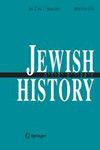14世纪《托拉》评论中的手稿Marginalia与犹太阅读史:Ephraim ben Shabbetai谈Eleazar Ashkenazi的《泄密者》
IF 0.4
2区 历史学
Q2 HISTORY
引用次数: 0
摘要
本文章由计算机程序翻译,如有差异,请以英文原文为准。
Manuscript Marginalia in a Fourteenth-Century Torah Commentary and the History of Jewish Reading: Ephraim ben Shabbetai on Eleazar Ashkenazi’s Revealer of Secrets
求助全文
通过发布文献求助,成功后即可免费获取论文全文。
去求助
来源期刊

Jewish History
HISTORY-
CiteScore
0.40
自引率
33.30%
发文量
10
期刊介绍:
The purpose of Jewish History, the sole English-language publication devoted exclusively to history and the Jews, is to broaden the limits of historical writing on the Jews. Jewish History publishes contributions in the field of history, but also in the ancillary fields of art, literature, sociology, and anthropology, where these fields and history proper cross paths. The diverse personal and professional backgrounds of Jewish History''s contributors, a truly international meeting of minds, have enriched the journal and offered readers innovative essays as well as special issues on topics proposed by guest editors: women and Jewish inheritance, the Jews of Latin America, and Jewish self-imaging, to name but a few in a long list.
 求助内容:
求助内容: 应助结果提醒方式:
应助结果提醒方式:


